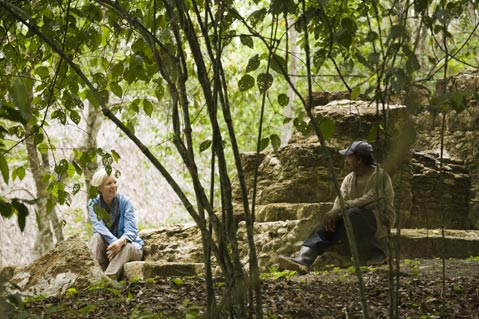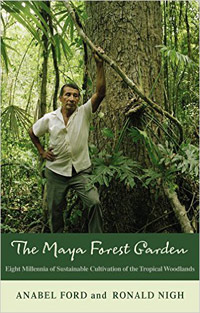Maya No Mystery to Her
UCSB Professor Anabel Ford’s New Book Bangs Drum on Sustainable-Forest-Cultivation Theory

In 2001, I traveled to the Belize-Guatemala border to report on UCSB archaeologist Anabel Ford’s many discoveries at El Pilar, the Maya monument complex she uncovered in 1983. That’s where she developed revolutionary theories that threatened to rock the academic world, namely that the Maya did not “disappear” due to an overpopulation cataclysm, but merely dwindled with time. Instead, Ford found that the Maya proudly persist in Mesoamerica; that they use the surrounding forest as a sustainable, civilization-supporting garden like they have for millennia; and that the use of fire is a critical part of that farming, not indicative of a widespread “slash-and-burn” culture that so many believe contributed to their demise.

Fifteen years later, though, Ford is banging those same drums while the tone-deaf academic establishment clings to ideas invented decades ago. Her latest strike is the book The Maya Forest Garden: Eight Millennia of Sustainable Cultivation of the Tropical Woodlands, which she coauthored with Ronald Nigh, a professor in Chiapas, Mexico. In relatively nontechnical language, the book uses research from multiple fields to detail the scientific evidence behind Ford’s belief that the Maya forest can indeed sustain a large population, suggesting that the collapse was probably more of a slow sociopolitical process than a carrying-capacity catastrophe.
We recently talked about the eye-opening insights of El Pilar, and what follows is a condensed version of our chat.
Why is the prevailing overpopulation-as-demise theory so rampantly believed? It’s entrenched in Western studies of how people look at the Earth. Even Malthus felt that we were going to run out of land to produce food, and the idea is to have a farm, you have to clear land, and there is not enough. Of course, that is the case when you have a plow and land with cows on it. The word “arable” just means plow, and in Europe, cultivatable is plowable, so it’s hard to wrest yourself from that view. That’s why we call that view ecological imperialism: Our route is the only route, and we look at anything that’s different as not fitting the model.
We are in California, where burning is very scary. But if you understand how to use and manage fire, it can be a good thing, too. When these people managed to get here 12,000 years ago, all they had were stone tools and fire. They had to work within that system. It’s embedded.
If you look at the way “slash-and-burn” sounds, rather than “selecting and growing,” it’s more about destroying, like rape and pillage. It’s given a bad name by the way it’s uttered. But people are starting to realize that there is a different way of doing things — we know what the cycles are; we know things come back.
Did you ever think archaeology would make you a plant expert? No, of course not, but I always liked plants. I’m not anything close to a botanist, but I am a good avocationalist in plants. I rely on these forest gardeners.
Your book suggests that part of the problem may be how archaeology as a field is isolated from agroecology, so archaeologists may now know what to examine to understand the past. It’s bigger than that, too. Every field is so insular. It’s not just the economic botany not talking to Maya archaeology and agroforestry. You’re involved in your own work, but if you are actually believing it, you really should look out. I don’t see how one could look at the ancient Maya and not consider geology, geography, water flow, plants, animals.
What will it take to change people’s minds? Well, I’m trying. How do I write a best-seller? I actually think this book is pretty readable. We need to get Oprah to pick this up.
4•1•1
Anabel Ford will sign copies of The Maya Forest Garden on Monday, November 23, at 7 p.m. at Chaucer’s Books. See chaucersbooks.com and marc.ucsb.edu for more info.



